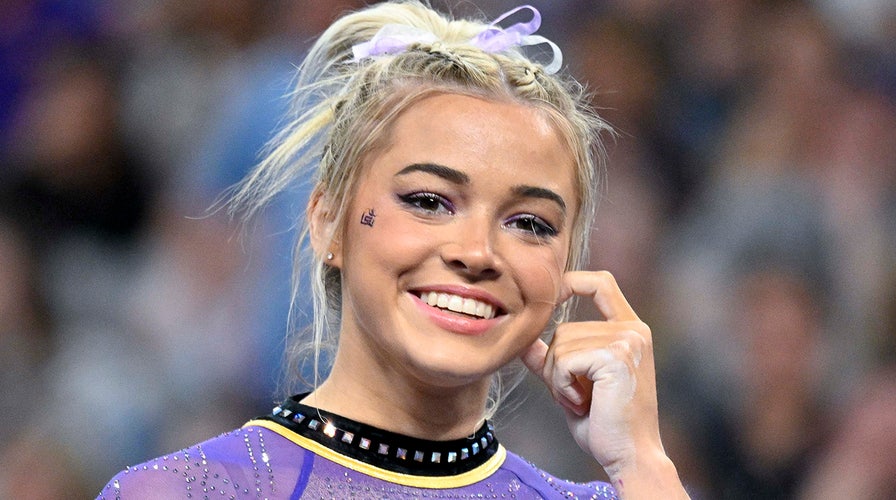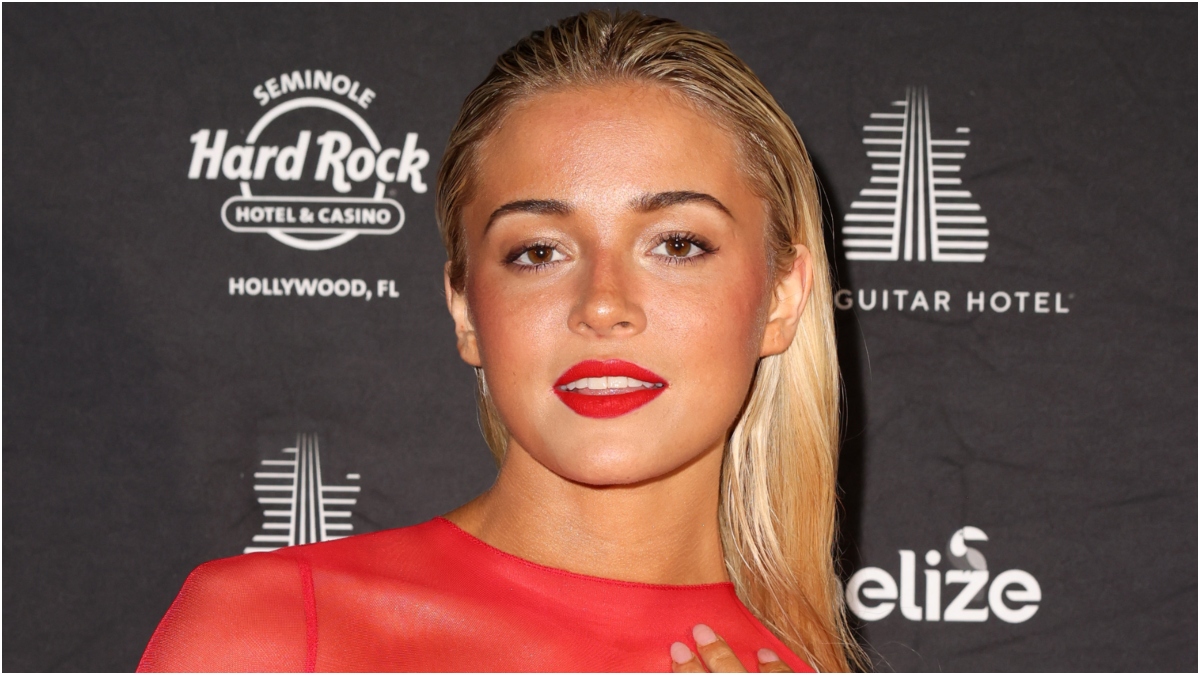In today's digital age, the rise of deepfake technology has sparked significant discussions about its implications on individuals, especially public figures like Olivia Dunne. As a renowned gymnast and social media personality, Olivia Dunne's presence in the public eye has made her a potential target for deepfake creators. Understanding the impact of deepfake technology on her career and personal life is crucial for safeguarding her digital identity.
Deepfake technology, which involves the use of artificial intelligence to create realistic but fake videos or images, has become increasingly sophisticated. It poses both opportunities and challenges, particularly for celebrities and influencers who rely heavily on their online presence. For Olivia Dunne, maintaining control over her digital representation is vital in an era where misinformation can spread rapidly.
This article delves into the world of Olivia Dunne deepfake, exploring its potential dangers, the technology behind it, and how individuals can protect themselves against such threats. By understanding these aspects, we aim to provide valuable insights into navigating the complexities of digital identity in the modern world.
Read also:Hannahlusttt The Rising Star In The Digital Era
Table of Contents
- Biography of Olivia Dunne
- What is Deepfake?
- Olivia Dunne and Deepfake Technology
- Impact on Reputation
- Legal Implications of Deepfakes
- The Technology Behind Deepfakes
- Prevention Strategies
- Future Trends in Deepfake Technology
- Ethical Considerations
- Conclusion
Biography of Olivia Dunne
Early Life and Career
Olivia Dunne, born on October 26, 1999, in New Jersey, USA, is a prominent figure in the world of gymnastics and social media. Her journey began at a young age, showcasing immense talent and dedication to the sport. Over the years, she has earned numerous accolades, including being named an All-American gymnast and competing at the NCAA level.
Data and Biodata
| Full Name | Olivia Dunne |
|---|---|
| Date of Birth | October 26, 1999 |
| Place of Birth | New Jersey, USA |
| Profession | Gymnast, Social Media Influencer |
| Education | University of Florida |
Olivia's rise to fame extends beyond her athletic achievements. Her engaging personality and captivating content on platforms like TikTok and Instagram have garnered her millions of followers, making her a household name in the digital space.
What is Deepfake?
Deepfake refers to the use of artificial intelligence and machine learning algorithms to create highly realistic but fake videos or images. This technology manipulates existing footage, often replacing one person's likeness with another, creating content that appears authentic but is entirely fabricated.
Deepfake technology has evolved rapidly, thanks to advancements in neural networks and generative adversarial networks (GANs). These innovations enable creators to produce content that is increasingly difficult to distinguish from reality, raising concerns about its ethical implications.
Olivia Dunne and Deepfake Technology
Why Celebrities are Targeted
Celebrities like Olivia Dunne are often targets for deepfake creators due to their widespread recognition and media presence. The allure of generating viral content using their likeness can lead to the creation of harmful or misleading materials.
For Olivia Dunne, whose career is built on trust and authenticity, the emergence of deepfake technology poses significant risks. Misrepresentation through deepfakes can damage her reputation and undermine her credibility as a public figure.
Read also:Princess Helayna Onlyfans Leaked Understanding The Controversy And Protecting Digital Privacy
Impact on Reputation
Damage to Personal Brand
Deepfake content can severely impact a celebrity's personal brand. For Olivia Dunne, whose career relies heavily on her image and integrity, the spread of false information can have lasting consequences. Fans and followers may question her authenticity, leading to a decline in trust and support.
Moreover, deepfakes can be used to manipulate public opinion, creating narratives that misrepresent her values and beliefs. This can lead to negative publicity and tarnish her reputation in the eyes of the public.
Legal Implications of Deepfakes
Current Laws and Regulations
The legal landscape surrounding deepfake technology is still evolving. While there are no specific laws addressing deepfakes, existing regulations on fraud, defamation, and copyright infringement can be applied in certain cases. However, the rapid pace of technological advancement often outstrips legislative efforts, leaving gaps in legal protections.
For celebrities like Olivia Dunne, pursuing legal action against deepfake creators can be challenging. Identifying the perpetrators and proving intent can be difficult, especially when content is shared anonymously across multiple platforms.
The Technology Behind Deepfakes
How Deepfakes are Created
Deepfake technology relies on advanced algorithms and vast amounts of data to generate realistic content. The process typically involves training neural networks on extensive datasets of images and videos, enabling them to replicate a person's appearance and mannerisms with remarkable accuracy.
Tools like face-swapping software and video editing platforms have made it easier for individuals with minimal technical expertise to create deepfakes. This democratization of technology has contributed to the proliferation of deepfake content online.
Prevention Strategies
Protecting Against Deepfakes
While it is challenging to entirely prevent deepfakes, individuals can take steps to minimize their impact. For Olivia Dunne, maintaining a strong digital presence and actively engaging with her audience can help counteract misinformation.
- Regularly monitor online platforms for unauthorized content.
- Utilize digital watermarking and encryption techniques to authenticate genuine content.
- Collaborate with social media platforms to report and remove deepfake content promptly.
- Educate followers about the dangers of deepfakes and encourage critical thinking when consuming online content.
Future Trends in Deepfake Technology
Emerging Developments
As technology continues to advance, deepfake capabilities are expected to become even more sophisticated. Innovations in real-time deepfake generation and enhanced realism will pose new challenges for individuals and organizations alike.
However, these developments also present opportunities for positive applications, such as enhancing entertainment experiences or aiding in educational content creation. Striking a balance between innovation and regulation will be crucial in shaping the future of deepfake technology.
Ethical Considerations
Moral Implications of Deepfakes
The ethical implications of deepfake technology extend beyond individual rights to broader societal concerns. The potential for misuse in spreading misinformation, perpetuating bias, and violating privacy necessitates careful consideration and responsible use.
For celebrities like Olivia Dunne, advocating for ethical guidelines and industry standards can help mitigate the negative effects of deepfakes. Encouraging transparency and accountability in content creation is essential in fostering a safer digital environment.
Conclusion
The rise of deepfake technology presents both challenges and opportunities in the digital age. For Olivia Dunne and other public figures, understanding its implications and taking proactive measures to protect their digital identities is crucial. By staying informed and engaged, individuals can navigate the complexities of deepfake technology and safeguard their reputations.
We invite you to share your thoughts and experiences in the comments below. Additionally, explore other articles on our site to learn more about digital trends and their impact on society. Together, we can promote a safer and more ethical online environment for everyone.


